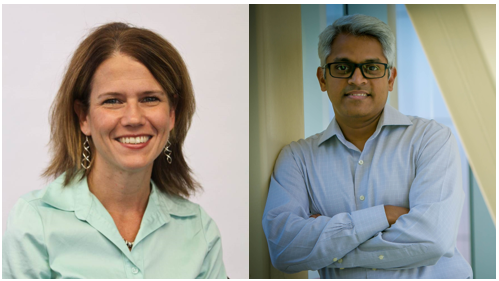The need for instruction in computer science in high school — and even grade school — is a hot topic in education. During summer, a program to provide such instruction was announced in Cleveland. The program involves the Cleveland Foundation, Cleveland Metropolitan School District and Cleveland State University. For background on this joint effort, we contacted two Cleveland State faculty members who are heavily involved: Nigamanth Sridhar, a professor of electrical engineering and computer science and program director of CS Ed Ohio, and Debbie K. Jackson, an associate professor in the College of Education and Human Services. They collaborated on their answers to our questions:
Q: How did CSforAll come about, and what were your roles in its inception and realization?
A: The CSforAll program in Cleveland is an extension of some of our earlier work in designing curriculum for, and training teachers to teach, the new AP Computer Science Principles course. As part of this National Science Foundation-funded project, the Cleveland State University team has been working since 2014 to teach teachers to teach CS Principles. To date, we have worked with 45 teachers from throughout Ohio.
Based on this work, in summer 2016, we launched an aggressive program in the Cleveland Metropolitan School District (CMSD) to make CS (computer science) classes available to all students in CMSD high schools. As of now, eight schools in the district offer CS classes, and during the next two years, we will expand the offering to include all high schools in the district.
We work closely with the district — Karen Thompson, deputy chief, curriculum and instruction, and Chelsey Cook, principal at John Marshall School of Information Technology — and the Cleveland Foundation in planning and implementing this project.

Q: Where did the funding come from?
A: The funding for the CSforAll program in CMSD — $124,235 — is from a grant from the Cleveland Foundation.
Q: What are the goals of the program?
A: The goals are to make CS classes available and accessible to all students in the CMSD. This will provide critical 21st century skills to all students in the district and allow them to take advantage of further opportunities in computer science.
Q: In July 2016, 25-30 CMSD teachers from middle and high schools were trained for the program. What did their training consist of, and what will their roles be?
A: The teachers received professional development to teach the AP CS Principles course as well as another course titled Exploring Computer Science (ECS). The ECS professional development took place in Dover, Delaware, and Baltimore, Maryland, and was led by the developers of the ECS curriculum. Several teachers also received training on incorporating Bootstrap, which is a CS module that incorporates CS concepts and provides additional tools for teaching Algebra I.

Q: What comes next in the program? What is planned for down the road?
A: We will continue the expansion plan, with the teachers who have been trained this year serving as a core resource group for new teachers. We will continue with the training to ensure that there is at least one teacher (preferably more) in each high school who has the knowledge base for teaching CS.
Q: CS does not meet any state standards for graduation, so how are you making the case that schools should invest in a subject the standards treat as an elective?
A: In the past decade, the CS education research community has worked toward building resources and capacity in numbers of teachers and support for schools. This combined effort by the community has brought to the forefront the idea that CS is a necessary knowledge area for future high school graduates. It is well acknowledged that a basic understanding of the digital world in which we live is necessary for future success in all realms of college and career readiness. Students in high schools as well as parents see the need for CS.
Furthermore, CS can count as a graduation credit in mathematics for students who started 9th grade in 2014.
Q: Are you hoping to eventually involve other Ohio school districts in similar programs?
A: As mentioned above, we have already worked with 45 schools from throughout Ohio in introducing the CS Principles course. We will continue our engagement with these schools and expand to districts that are interested in CS education curricula.
Q: Is there anything else we should know about CSforAll or, in general, about efforts to add computer science to school curricula?
A: CSforAll is a national movement, with support and leadership from the White House Office of Science and Technology Policy, the National Science Foundation, and a number of other agencies. This movement is the result of nearly a decade of research and work on the role, importance and feasibility of CS courses in K-12 schools. We are excited to be part of this movement and creating opportunities for our students.